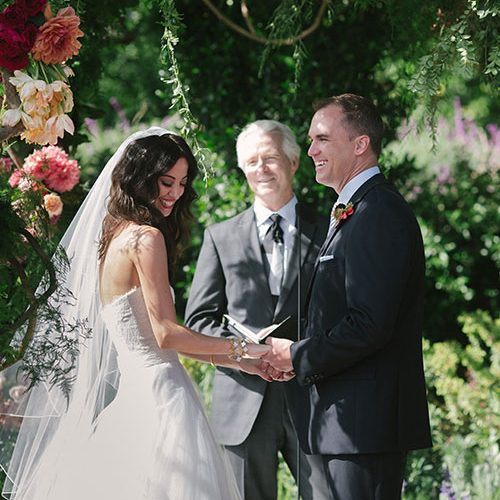
Photo: Amy & Stuart Photography
Congratulations! You’ve been invited to officiate at a friend’s wedding. It’s a big honor, but it also comes with lots of responsibility. In addition to helping write the wedding ceremony (or writing most of it yourself), there are legal details you’ll need to keep track of. So if you’re brand new to officiating, what must you do when performing a wedding ceremony? Here are four things our experts want to make sure you don’t forget.
Make Sure it’s Legal
As soon as you’re invited to officiate at a wedding, look into the laws of the county and state where the couple will be tying the knot and familiarize yourself with any requirements you’ll need to meet to perform the marriage. Can you get ordained online? How long will your ordination need to be valid for? Do you need specific documentation to include with their marriage license? Or are they saying “I do” in one of the few parts of the country where the couple can self-solemnize their own marriage (Colorado, Wisconsin, the District of Columbia, and parts of Pennsylvania), allowing you to serve a symbolic role without any legal requirements? Figure out exactly what you need to do, any deadlines you should be aware of, documentation you have to have, and fees that need to be paid, and make sure everything is taken care of well in advance.
Write it Down
Officiating a wedding is not the time to wing it. Instead, sit down with the couple to talk about what they’d like from their ceremony, and whether they’d like to help you write it or would prefer to give ideas and let you go from there. Even if they want most of the content to be a surprise (particularly your introduction and any statements you might make about the meaning of marriage and their relationship), you’ll want to work with them to choose readings and select readers. You should also make sure the couple has a chance to read over the vows, so they can practice their lines in advance.
See more: 5 Things to Look for In a Wedding Officiant
Practice Makes Perfect
Having a script written isn’t enough. Before the ceremony rehearsal arrives, take time to practice reading through your script. Make notes about where to pause for effect (or even consider re-formatting the document with line breaks to encourage yourself to slow down) and practice saying words that might get stuck on your tongue. This is a great way to get used to what you’ll be saying to minimize how emotional you may be on the wedding day — you’ll be more familiar with the lines, so hopefully you won’t get too choked up! Read through the script in front of a mirror to practice making eye contact with the couple and the audience.
Sign on the Dotted Line
On the wedding day, after your duties are complete, make sure you remember to sign the marriage license! In a state where an officiant is required, the document isn’t binding without your signature. You may also need to mail the license back to the recorder’s office, or the couple can do that themselves.
